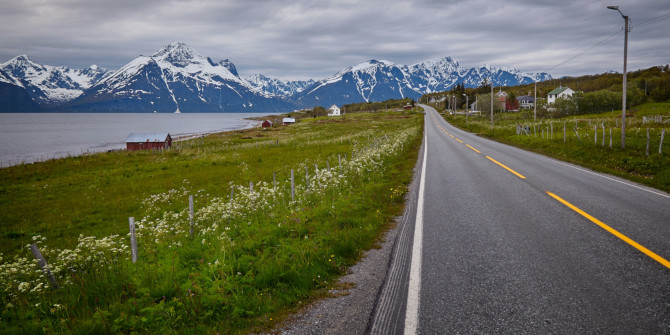Following the fall of the Soviet Union, several legal changes were made in Russia that strengthened LGBTQ rights. Radzhana Buyantueva writes that while these changes had a positive impact during the 1990s, their legacy has largely been undone during Vladimir Putin’s leadership.
The fall of the Soviet Union was accompanied by the liberalisation of society, including the legalisation of homosexuality in 1993. A few years later, Russian criminal law made heterosexual and same-sex relations equal in terms of the age of consent and punishments for crimes (previously, there was a clear distinction, with homosexual sexual assault incurring a harsher penalty). In 2008, Russia also repealed its ban on gay men donating blood.
As for transgender rights, it became possible to change the legal gender on identity documents from 1997. In 2018, this process was simplified significantly, permitting the change of legal gender based on a medical certificate without the need for surgery or hormone replacement therapy. These are among the few positive legal changes that have taken place in Russia concerning the LGBTQ community.
Since then, however, there have been no further improvements regarding LGBTQ rights in the country. There is no explicit legal protection against discrimination based on sexual orientation and gender identity. What is more, since 2020, same-sex unions have been banned by the Russian Constitution. It is no news to anyone at this point that Russia has become a notorious promoter of ‘traditional values’ and a denier of gender norms and LGBTQ rights. Indeed, the question now is whether these rights are likely to be further eroded.
Russia’s conservative turn
In December 2022, a new anti-LGBTQ law was signed by President Vladimir Putin, banning ‘propaganda of non-traditional sexual relations’ to all age groups. According to Russian lawmakers, positive and even neutral depictions of same-sex relations in the media, advertising, books, films, and other sources can be considered ‘propaganda’ in this context and should be forbidden.
Any public act or mention of LGBTQ-related topics or symbols can potentially be viewed as propaganda. Anyone found guilty of violating the law can be fined up to 400,000 roubles (€5,050), with much higher fines for organisations and journalists. The new law expands the law adopted in 2013 that prohibited such propaganda being distributed among children. This anti-LGBTQ legislation is the result of Russia’s conservative turn in the 21st century.
In the last decade, the Russian state has begun a forceful promotion of conservatism, which is built on the following principles: an emphasis on the interests of the state, respect for authority, religion as a spiritual strength, patriotism as a moral basis, Russia’s special role based on its unique traditions and values, and heteronormative notions of gender and sexuality. A ‘traditional family’ and patriarchal ideals have effectively been turned into a matter of national security and survival.
In November 2022, ‘Russian traditional spiritual and moral values,’ including the traditional nuclear family, received legal protection. Non-heteronormativity has been portrayed as a western phenomenon that goes against ‘traditional values’ and threatens the Russian nation.
The Russian political elite and state-controlled media has adopted a narrative of the West using LGBTQ rights as a tool to undermine and destabilise the country. Nikolai Patrushev, Secretary of the Security Council, has warned that the West is aggressively imposing neoliberal values such as same-sex marriage on other countries to blur the traditions, faith, and historical generational memory that have developed over the centuries.
LGBTQ rights as a geopolitical tool
In this manner, Russia’s conservatism has grown into a geopolitical agenda built on enmity towards the West, which we can observe in Russia’s aggression in Ukraine. Putin has repeatedly justified Russia’s military actions by citing the need to defend the country from degradation caused by the West.
During his speech to mark the annexation of four Ukrainian regions (Donetsk, Luhansk, Kherson, and Zaporizhzhia), Putin declared Russia a protector of traditional values from western liberalism, which he compared to “satanism”. He painted the war in Ukraine as a just and defensive war against harmful western liberal values, including gender norms and LGBTQ rights:
“Do we want to have here, in our country, in Russia, a parent number one, number two, number three instead of mum and dad?… Do we want perversions that lead to degradation and extinction to be imposed on children in our schools? To be drummed into them that besides women and men, there are supposedly some other genders? To be offered to undergo sex change surgery? We have a different future, our future.” – Vladimir Putin
The Kremlin’s hostility towards the West is irrevocably intertwined with increasing authoritarianism, manifesting in strengthening repression and limitations of political freedoms. The West is seen as influencing critics and opponents of the regime. To block this imagined threat from the West, the ‘foreign agent law’ has become a powerful instrument of repression at the disposal of the Russian government. Nowadays, anyone ‘under foreign influence’ and whose activities ‘contradict Russia’s national interests’ can be labelled as a ‘foreign agent’.
In other words, any public criticism of Russian policies or officials could be the cause of being declared a ‘foreign agent’. ‘Foreign influence’ is vaguely defined as any kind of support from abroad such as funding, informational and technical assistance, and ‘other means’. ‘Foreign agents’ are excluded from key aspects of public life, including civil service, participating in elections, and even teaching.
Defenders of LGBTQ rights are among the most frequently included on the list of ‘foreign agents,’ which complicates their work and stigmatises them in the public eye. The term ‘foreign agent’ has negative connotations such as ‘spy’, ‘enemy’, and ‘traitor’. Combined with the ban on ‘LGBTQ propaganda’, the ‘foreign agent’ law obstructs the work of LGBTQ activists and human rights advocates to a great extent.
Hope against hope
Putin’s conservative authoritarianism has had a heavy impact on the current socio-political climate in the country, facilitating censorship of LGBTQ themes, bans of LGBTQ events, and state-endorsed public homophobia. The Russian authorities have consistently banned Pride parades and other events, refused to register LGBTQ organisations, and issued homophobic statements.
Most worrying, the Kremlin’s conservative political paradigm has instigated a wave of homophobic attacks, hate, and discrimination. According to research conducted by Alexander Kondakov, there has been a substantial increase in the number of hate crimes since the adoption of the law banning the distribution of LGBTQ propaganda to children in 2013. The police do not offer sufficient protection against anti-LGBTQ violence, and police officers even perpetuate it themselves.
The Russian state has been steadfastly cracking down on the LGBTQ community, depicting non-heteronormativity as an issue of security and survival of the nation. The recent ban on LGBTQ propaganda will likely further complicate the lives of LGBTQ Russians, potentially leading to higher LGBTQ immigration. Those who stay might be forced ‘back into the closet’. Most likely, the LGBTQ community will have to resort to Soviet-era tactics of relying on caution and discretion for meetings and gatherings.
The LGBTQ community has become a convenient scapegoat in attempts to build patriotic conservatism. However, we should not assume Russian society is widely homophobic. The popularity of TikTok videos with LGBTQ content among young Russians may serve as a positive indicator for that. The popularity of such videos shows there is hope in the younger generation, who may yet strive to establish a more liberalised future for Russia where LGBTQ rights are recognised and protected.
Note: This article gives the views of the author, not the position of EUROPP – European Politics and Policy or the London School of Economics. Featured image credit: Alexander Grey on Unsplash





This despotic behavior limits the creativity, freedom, and prosperity of the country. Hopefully, leaders will recognize that compassion and personal freedom represent strength and true spiritual empowerment.